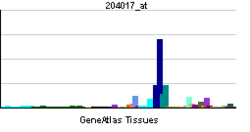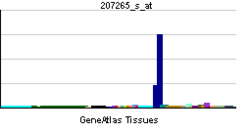KDELR3
ER lumen protein retaining receptor 3 is a protein that in humans is encoded by the KDELR3 gene.[3]
Retention of resident soluble proteins in the lumen of the endoplasmic reticulum (ER) is achieved in both yeast and animal cells by their continual retrieval from the cis-Golgi, or a pre-Golgi compartment. Sorting of these proteins is dependent on a C-terminal tetrapeptide signal, lys-asp-glu-leu (KDEL) in animal cells and his-asp-glu-leu (HDEL) in S. cerevisiae. This process is mediated by a receptor that recognizes, and binds the tetrapeptide-containing protein, and returns it to the ER. In yeast, the sorting receptor encoded by a single gene, ERD2, is a seven-transmembrane protein. Unlike yeast, several human homologs of the ERD2 gene, constituting the KDEL receptor gene family, have been described. KDELR3 was the third member of the family to be identified, and it encodes a protein highly homologous to KDELR1 and KDELR2 proteins. Two transcript variants of KDELR3 that arise by alternative splicing, and encode different isoforms of KDELR3 receptor, have been described.[3]
See also
References
Further reading
- Pelham HR (1997). "The dynamic organisation of the secretory pathway.". Cell Struct. Funct. 21 (5): 413–9. doi:10.1247/csf.21.413. PMID 9118249.
- Gerhard DS, Wagner L, Feingold EA, et al. (2004). "The status, quality, and expansion of the NIH full-length cDNA project: the Mammalian Gene Collection (MGC).". Genome Res. 14 (10B): 2121–7. doi:10.1101/gr.2596504. PMC 528928
 . PMID 15489334.
. PMID 15489334.
- Collins JE, Wright CL, Edwards CA, et al. (2005). "A genome annotation-driven approach to cloning the human ORFeome.". Genome Biol. 5 (10): R84. doi:10.1186/gb-2004-5-10-r84. PMC 545604
 . PMID 15461802.
. PMID 15461802.
- Collins JE, Goward ME, Cole CG, et al. (2003). "Reevaluating human gene annotation: a second-generation analysis of chromosome 22.". Genome Res. 13 (1): 27–36. doi:10.1101/gr.695703. PMC 430954
 . PMID 12529303.
. PMID 12529303.
- Strausberg RL, Feingold EA, Grouse LH, et al. (2003). "Generation and initial analysis of more than 15,000 full-length human and mouse cDNA sequences.". Proc. Natl. Acad. Sci. U.S.A. 99 (26): 16899–903. doi:10.1073/pnas.242603899. PMC 139241
 . PMID 12477932.
. PMID 12477932.
- Dunham I, Shimizu N, Roe BA, et al. (1999). "The DNA sequence of human chromosome 22.". Nature. 402 (6761): 489–95. doi:10.1038/990031. PMID 10591208.
- Suzuki Y, Yoshitomo-Nakagawa K, Maruyama K, et al. (1997). "Construction and characterization of a full length-enriched and a 5'-end-enriched cDNA library.". Gene. 200 (1-2): 149–56. doi:10.1016/S0378-1119(97)00411-3. PMID 9373149.
- Maruyama K, Sugano S (1994). "Oligo-capping: a simple method to replace the cap structure of eukaryotic mRNAs with oligoribonucleotides.". Gene. 138 (1-2): 171–4. doi:10.1016/0378-1119(94)90802-8. PMID 8125298.


 . PMID 15489334.
. PMID 15489334. . PMID 15461802.
. PMID 15461802. . PMID 12529303.
. PMID 12529303. . PMID 12477932.
. PMID 12477932.